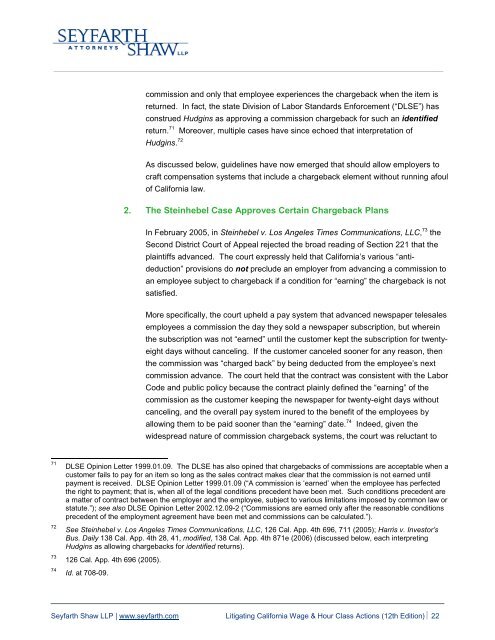Litigating California Wage & Hour and Labor Code Class Actions
Litigating California Wage & Hour and Labor Code Class Actions
Litigating California Wage & Hour and Labor Code Class Actions
You also want an ePaper? Increase the reach of your titles
YUMPU automatically turns print PDFs into web optimized ePapers that Google loves.
commission <strong>and</strong> only that employee experiences the chargeback when the item is<br />
returned. In fact, the state Division of <strong>Labor</strong> St<strong>and</strong>ards Enforcement (“DLSE”) has<br />
construed Hudgins as approving a commission chargeback for such an identified<br />
return. 71 Moreover, multiple cases have since echoed that interpretation of<br />
Hudgins. 72<br />
As discussed below, guidelines have now emerged that should allow employers to<br />
craft compensation systems that include a chargeback element without running afoul<br />
of <strong>California</strong> law.<br />
2. The Steinhebel Case Approves Certain Chargeback Plans<br />
In February 2005, in Steinhebel v. Los Angeles Times Communications, LLC, 73 the<br />
Second District Court of Appeal rejected the broad reading of Section 221 that the<br />
plaintiffs advanced. The court expressly held that <strong>California</strong>’s various “antideduction”<br />
provisions do not preclude an employer from advancing a commission to<br />
an employee subject to chargeback if a condition for “earning” the chargeback is not<br />
satisfied.<br />
More specifically, the court upheld a pay system that advanced newspaper telesales<br />
employees a commission the day they sold a newspaper subscription, but wherein<br />
the subscription was not “earned” until the customer kept the subscription for twentyeight<br />
days without canceling. If the customer canceled sooner for any reason, then<br />
the commission was “charged back” by being deducted from the employee’s next<br />
commission advance. The court held that the contract was consistent with the <strong>Labor</strong><br />
<strong>Code</strong> <strong>and</strong> public policy because the contract plainly defined the “earning” of the<br />
commission as the customer keeping the newspaper for twenty-eight days without<br />
canceling, <strong>and</strong> the overall pay system inured to the benefit of the employees by<br />
allowing them to be paid sooner than the “earning” date. 74 Indeed, given the<br />
widespread nature of commission chargeback systems, the court was reluctant to<br />
71<br />
72<br />
73<br />
74<br />
DLSE Opinion Letter 1999.01.09. The DLSE has also opined that chargebacks of commissions are acceptable when a<br />
customer fails to pay for an item so long as the sales contract makes clear that the commission is not earned until<br />
payment is received. DLSE Opinion Letter 1999.01.09 (“A commission is ‘earned’ when the employee has perfected<br />
the right to payment; that is, when all of the legal conditions precedent have been met. Such conditions precedent are<br />
a matter of contract between the employer <strong>and</strong> the employee, subject to various limitations imposed by common law or<br />
statute.”); see also DLSE Opinion Letter 2002.12.09-2 (“Commissions are earned only after the reasonable conditions<br />
precedent of the employment agreement have been met <strong>and</strong> commissions can be calculated.”).<br />
See Steinhebel v. Los Angeles Times Communications, LLC, 126 Cal. App. 4th 696, 711 (2005); Harris v. Investor’s<br />
Bus. Daily 138 Cal. App. 4th 28, 41, modified, 138 Cal. App. 4th 871e (2006) (discussed below, each interpreting<br />
Hudgins as allowing chargebacks for identified returns).<br />
126 Cal. App. 4th 696 (2005).<br />
Id. at 708-09.<br />
Seyfarth Shaw LLP | www.seyfarth.com <strong>Litigating</strong> <strong>California</strong> <strong>Wage</strong> & <strong>Hour</strong> <strong>Class</strong> <strong>Actions</strong> (12th Edition) 22
















